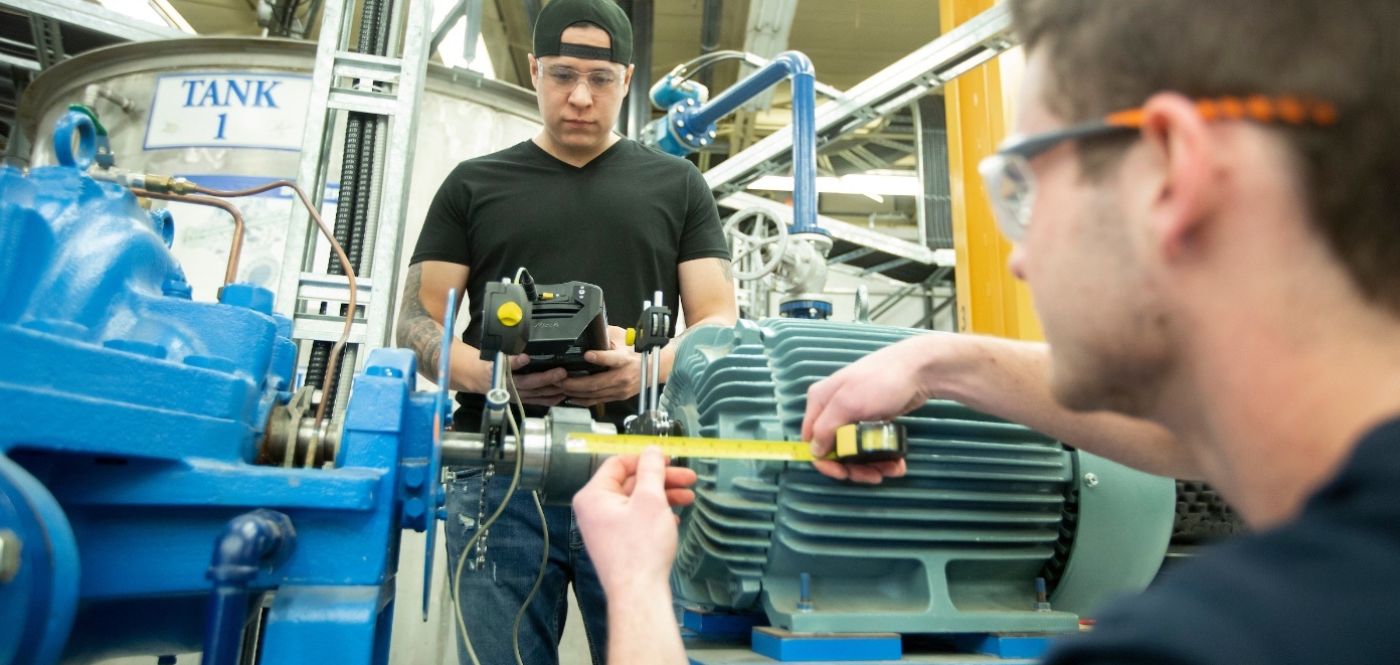
If you like working with machinery, enjoy solving mechanical problems and are good with your hands, check out the Industrial Mechanics applied certificate program. You’ll get the knowledge and skills you need to install, repair, overhaul and maintain stationary, industrial machinery and mechanical equipment.
Start date
Delivery is subject to needs assessment
Length
16 weeksLocations(s)
Delivery is subject to needs assessment.Demand for industrial mechanics—also called millwrights—is high across western Canada. Oil and gas, and mining are big employers, but there’s also demand in manufacturing, milling, power generation and chemical plants. Working in well-equipped shops with highly qualified instructors, you’ll get practical, hands-on training in:
- trade math, drafting and blueprint reading
- welding and cutting
- using tools of the trade
The Industrial Mechanics applied certificate program is mainly delivered off campus through continuing education at Regional Colleges. It may be offered at all Saskatchewan Polytechnic campuses subject to a needs assessment.
50% shop time, 50% class time
Apprenticeship credit
Career and salary information
Your career
Industrial mechanics are also known by other trade names (i.e., maintenance mechanics, millwrights or machine repairmen). Graduates may find employment in commercial or industrial operations that use machinery. These include wood, cereal, meat processing and power generating plants, hard rock and potash mines, mills and refineries.
Potential careers
| Sample job title | NOC classification |
|---|---|
| Construction Millwright | Construction millwrights & industrial mechanics (72400) |
| Industrial Mechanic | Construction millwrights & industrial mechanics (72400) |
Part-time delivery
There are no part-time options for this program. However, there are courses you can take prior to acceptance into the program that will decrease your course load once you’ve been accepted.
View the A-Z course listing for a complete list of courses and additional information.
To register for individual courses, please view the part-time offerings available in the Courses section below.Admissions
Admission requirements
- Grade 12 with one of the following mathematics: Foundations of Math 20 or Workplace and Apprenticeship Math 20 or Pre-Calculus 20
- English Language Requirement
Alternative admission
Applicants who do not possess the academic qualifications for a program may be admitted if evidence of probable success can be established through an alternative admission assessment. Applicants are automatically considered for alternative admission. However, some specific admission requirements may still need to be met.
ACCUPLACER©
Refer to the ACCUPLACER© cut scores for this program below, and review additional details concerning Alternative Admission using Accuplacer.
- 250 Arithmetic
- 245 Quantitative Reasoning, Algebra, and Statistics
- 247 Reading
- 241 Writing
Post-secondary
Some programs allow applicants to meet the admission grade level requirement using 15 approved post-secondary credits. Review additional information.
If the program applied to has specific course requirements, they may be met through alternative post-secondary courses. Review already approved courses that may be used for admission purposes for your programs.
Admission method
First Qualified/First AdmittedThe First Qualified/First Admitted (FQFA) process is used for the majority of Saskatchewan Polytechnic programs. When we determine that you meet the program's admission requirements, you will be offered admission based on the date you fully qualify for the program. The earlier you provide the appropriate documents and information that qualify you for admission to the next intake, the earlier you might begin your studies. Your application, once qualified, is always considered for the next intake.
Applicants to programs with multiple intakes in an academic year remain in the application pool until the last intake for that academic year has begun. Programs using the FQFA process receive applications year round and maintain an application pool for each academic year. Qualified applicants who are not offered a seat must reapply for the next academic year.
Sponsored programs or programs targeted to specific groups do not accept applications year round or maintain an application pool.
See Admission Processes for more information about this method of admission.
Tuition and fees
Estimates are based on current rates and are subject to change. Amounts for a program may vary by campus. Totals shown here include all mandatory fees as well as approximate cost for books and supplies. Visit the Tuition and Fees web page for a complete breakdown of tuition and fees for this program.2024-25 academic year
To be determined
Courses
Get credit for what you know
Prior Learning Assessment and Recognition
Saskatchewan Polytechnic recognizes that adults learn in many different ways. This includes acquiring knowledge and skills through life and work experience or non-formal training.
See link(s) below to get more information about PLAR.
Transfer credit
Many Sask Polytech students benefit from transferring course credit. You may be eligible to transfer credit to Sask Polytech or to another college or university.
Student awards
Thanks to the generosity of donors and alumni, Saskatchewan Polytechnic gives away more than $2 million in student awards during the academic year.
Saskatchewan Polytechnic offers student awards for every certificate and diploma program at every campus. Not all student awards are based on marks - some are based on financial need or things like community or volunteer involvement.
